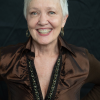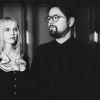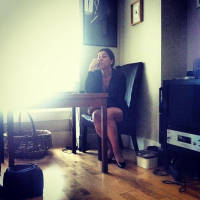Home » Jazz Musicians » Abbey Lincoln
Abbey Lincoln

"How can you have a career and never say anything? To experience it all and not say a word, you're supposed to stand up and speak your mind in the music. Some people like to hear some reality. I'm not trying to save or fix the world. I'm just singing about my experiences. My songs are observations."
For four decades Lincoln's life has been a constant transformation of experience, of awakenings into growth, of the communication of what she has witnessed. She has grown through many stages: a naive young lounge singer; a movie and jazz club sex kitten; a vocal African-American with a deepened cultural awareness; a sensitive actress contradicting cultural perceptions; an artistic and cultural exile; a poetic jazz sage. She has gone by many names, finding and then defining herself individually, culturally, and humanistically. Lincoln's music, which at first served as an escape from the life around her, grew into a means of expression, understanding, and communication with others.
Lincoln was born Anna Marie Wooldridge in Chicago in 1930. Her parents soon moved the family to Calvin Center, Michigan, her mother believing a rural area was the best place to raise a family. Since the family was poor, the children often had to entertain themselves with singing, but as the tenth of twelve children, Lincoln had a hard time distinguishing herself. She also sang in school and church choirs, often as a soloist. Her musical approach, however, was mainly influenced by recordings of singers her father borrowed from neighbors: Billie Holiday, Ella Fitzgerald, Sarah Vaughan, Lena Horne.
Lincoln proved her own singing capabilities by winning an amateur contest when she was 19 and began her musical career by moving to Los Angeles to sing in nightclubs. By 1952, she had moved to Honolulu to perform as a resident club singer under the stage name Anna Marie, but she still hadn't developed her own identity as a singer.
Lincoln returned to Hollywood in 1954 to sing at the Moulin Rouge, a nightclub with a French-style revue. Under the advice of her manager, lyricist Bob Russell, she changed her name to Abbey Lincoln. She made her recording debut in 1955 “Abbey Lincoln's Affair. A Story of a Girl in Love” (Bluenote) and went on to make several important albums for Riverside as “That’s Him”, “It’s Magic”, and “Abby is Blue”. These albums featured Max Roach on drums, with whom she also collaborated on 1960's landmark jazz civil rights recording, “We Insist! Freedom Now Suite”, composed by Max Roach with lyrics by Oscar Brown, Jr. Her studio sessions included some remarkable sidemen as Kenny Dorham, Sonny Rollins, Wynton Kelly, Curtis Fuller and Benny Golson.. She recorded “Straight Ahead” (Candid) in 1961 which included Roach, Booker Little, Eric Dolphy and Coleman Hawkins. There was a spell in the mid ‘60’s, in which she pursued an acting career and did not record, save for one date in ’68 again with Max Roach, whom she married in 1962. She wrote “Blues for Mama”, which was covered brilliantly by Nina Simone in 1966.
Read moreTags
Abbey Lincoln, Dorothy Ashby Birthdays, New Releases From Ragan Whiteside, Nicole Zuraitis, Lonnie Plaxico, Tierney Sutton & More

by Mary Foster Conklin
This broadcast includes new releases from Ragan Whiteside, Nicole Zuraitis, Lonnie Plaxico and Tierney Sutton, with birthday shoutouts to Louis Armstrong, Regina Carter, Abbey Lincoln, Dorothy Ashby, Cyrille Aimee, Terri Lyne Carrington, Trudy Pitts, Meg Okura and Roberta Piket, among others. Happy listening and please support the artists you hear--see them live, buy their music so they can continue to comfort, distract, provoke and remind the world that A Woman's Place is in the Groove. Many thanks for tuning in. ...
Continue ReadingNew Releases Plus Birthday Shoutouts To Some Formidable Jazz Leos

by Mary Foster Conklin
This broadcast includes new releases from Cyrille Aimee, Tony Guerrero & Jeremy Siskind, Melinda Rose plus singles from Kristin Korb and Carla Hassett, with birthday shoutouts to organist Trudy Pitts, composer Bernice Petkere (Close Your Eyes, Lullaby of the Leaves), harpist Dorothy Ashby, vocalists Jeri Southern, Abbey Lincoln, Cyrille Aimee, Sarah Moule, Roberta Donnay, pianist Roberta Piket and violinists Meg Okura and Regina Carter, among others. Happy listening and please support the artists you hear by seeing them live and ...
Continue ReadingNew Releases, Birthday Shoutouts To Abbey Lincoln, Dorothy Ashby, Regina Carter, Connie Converse & More

by Mary Foster Conklin
This broadcast includes new releases from Matt Catingub, Gabriela Martina, Olivia Van Goor and Jack Jones, with birthday shoutouts to Louis Armstrong, Tony Bennett, Abbey Lincoln, Dorothy Ashby, Terri Lyne Carrington, Regina Carter, Kat Edmonson and Connie Converse, among others. Thanks for listening and please support the artists you hear by seeing them live and online. Purchase their music so they can continue to distract, comfort, provoke and inspire.Playlist Louis Armstrong “Hotter Than That" from West End Blues ...
Continue ReadingMusic Is The Magic - Birthday Celebrations for Dorothy Ashby, Abbey Lincoln, Louis Armstrong And More

by Mary Foster Conklin
This broadcast presents new releases from Mike Clark & Leon Lee Dorsey, vocalist Lauren Henderson and saxophonist Jessy J, with birthday shoutouts to jazz greats Dorothy Ashby, Tony Bennett, Louis Armstrong, Terri Lyne Carrington, and Abbey Lincoln among others, plus a celebration of Joni Mitchell's remarkable performance at the Newport Folk Festival. Thanks for listening and please support the artists you hear by purchasing their music during this time of pandemic so they can continue to distract, comfort, provoke and ...
Continue ReadingStraight Ahead: il canto di protesta di Abbey Lincoln dal 1957 al 1961

by Maurizio Zerbo
La lettura di un libro sull'Africa, l'intuizione del manager, e la frequentazione di artisti impegnati nella rivendicazione dei diritti civili determinarono il cambio di passo nello status artistico di Anna Maria Woolridge, tra il 1956 e il 1961. Cantante nei night club californiani con lo pseudonimo di Gaby Lee, era una artista di varietà quando decise di cambiare stile di vita e assumere il nome d'arte Abbey Lincoln (da Abraham Lincoln), come simbolo di una fiera identità afroamericana che aveva ...
Continue ReadingFred, Bird, Carmen, Nat, Abbey, New Bu & More

by Marc Cohn
Oh, do we have a show for you. I was reading Will Friedwald's great book, The Great Jazz & Pop Vocal Albums, and discovered a Fred Astaire recording on Verve. We checked it out and spent a couple of very pleasant hours with Fred talking and singing in company of esteemed jazz artists. Our first segment includes a track, as well as other Astaire-associated tunes. Speaking of vocals, it's the Carmen McRae centennial, so we do a compare and contrast ...
Continue ReadingA Pride of Jazz Leos - Louis Armstrong, Abbey Lincoln, Dorothy Ashby & More

by Mary Foster Conklin
Lots of Jazz Leos to celebrate on today's broadcast. Included are new releases from Beth Duncan, Regina Carter, Ken Steele plus a special pandemic single from Lauren Lee, with birthday shoutouts to Abbey Lincoln, Louis Armstrong, KJ Denhert, Hendrik Meurkens, Kat Gang, Dorothy Ashby, Kat Edmonson, Roberta Piket, Terri Lyne Carrington and more. Thanks for listening and please support the artists you hear by purchasing their music during this time of lockdown. Playlist Louis Armstrong “Hotter Than That" ...
Continue ReadingSpirit Of Abbey Lincoln Invoked Through Up And Coming Jazz Singer's Theatrical Tribute And New Album Release

Source:
Akosua Gyebi
For two weekends in March, up and coming jazz singer-songwriter Kosi, accompanied by a four-piece band of world class musicians (Brendon Biagi, Aron Marchak, Christopher Hall, and Isaiah Pierce), will be performing a tribute to recently departed jazz icon Abbey Lincoln at the WOW Cafe Theater in New York City. This tribute, called Ghosts Appearing through the Sound, will feature original interpretations of the musical compositions, lyrics, and poetry of Abbey Lincoln, in addition to some more contemporary compositions to ...
read more
Abbey Lincoln's Style Influences New Set of Recordings

Source:
AAJ Staff
In jazz, as in any music, a voice can sometimes stop you in your tracks. Abbey Lincoln, who died this month at 80, possessed that kind of voice: taut and insistent, ablaze with authority. It was a gift, and by no means her only one. Ms. Lincoln was also an arresting physical presence, on screen as onstage, and she proved herself an intuitive songwriter and a figure of unyielding social conscience. Her evolution was a part of her art. All ...
read more
Abbey Lincoln-"Throw It Away"

Source:
Brilliant Corners, a Boston Jazz Blog
By Steve Provizer I've been a real intellectual yente for the last several posts. I hope those posts have not been without emotional weight, but the death of Abbey Lincoln makes me want to write a piece where emotion leads and analysis creeps along far behind. In the late 1960's, I went to the old WGBH studios to see her then-husband Max Roach record a TV show. I didn't think twice about the fact that she was also performing. I ...
read more
Joe Lovano on Abbey Lincoln

Source:
AAJ Staff
"Abbey was one of the most distinctive voices in modern jazz. She told some beautiful honest stories about her life and experiences and had a way of expression that touched you in a very personal way. Abbey's tunes and interpretations were full of meaning with each word articulated with deep passion. She was a beautiful story teller. I learned how to speak a melody playing and listening to her in a more personal way. When she called me to play ...
read more
Abbey Lincoln-"Throw It Away"

Source:
Brilliant Corners, a Boston Jazz Blog
I've been a real intellectual yente for the last several posts. I hope those posts have not been without emotional weight, but the death of Abbey Lincoln makes me want to write a piece where emotion leads and analysis creeps along far behind. In the late 1960's, I went to the old WGBH studios to see her then-husband Max Roach record a TV show. I didn't think twice about the fact that she was also performing. I was dazzled initially ...
read more
Abbey Lincoln, Jazz Singer and Writer, Dies at 80

Source:
AAJ Staff
Abbey Lincoln, a singer whose dramatic vocal command and tersely poetic songs made her a singular figure in jazz, died on Saturday in Manhattan. She was 80 and lived on the Upper West Side. Her death was announced by her brother David Wooldridge. Ms. Lincoln's career encompassed outspoken civil rights advocacy in the 1960s and fearless introspection in more recent years, and for a time in the 1960s she acted in films, including one with Sidney Poitier. Long recognized as ...
read more
Remembering Abbey Lincoln: August 6, 1930 - August 14, 2010

Source:
Dee Dee McNeil
I met Abbey Lincoln in the early 1970's in Watts and interviewed her for the Soul and Jazz Record Magazine in 1976. Here are some excerpts from that interview. You may not recognize the name “Aminada Moseka" but the moment you see those bright, brown eyes twinkling from beneathe a cluster of beaded braids; as soon as she smiles that warm, honest, pleasant way; as immediate as her words and meanings plunge the space between us with wisdom, that's when ...
read more
Abbey Lincoln, RIP

Source:
Rifftides by Doug Ramsey
Abbey Lincoln died today in New York. The singer and actress was 80 years old. After meeting Max Roach when he played drums on one of her record sessions in 1957, Ms. Lincoln came under his sway in her approach to music and in uncompromising civil rights activism. She and Roach married in 1962 and divorced eight years later, but his influence steered her toward a later career as a song writer and recording artist with a string of successful ...
read more
Jazz Musician of the Day: Abbey Lincoln

Source:
Michael Ricci
All About Jazz is celebrating Abbey Lincoln's birthday today!
JAZZ MUSICIAN OF THE DAY Abbey Lincoln
Abbey Lincoln - vocalist, composer, recording artist “How can you have a career and never say anything? To experience it all and not say a word, you\'re supposed to stand up and speak your mind in the music... more
Website | Videos | Articles
Follow Abbey Lincoln
Put AAJ's Musician of the Day box ...
read more
























































_with_Skip_Mcdonald_(Right)_23_n.jpg)










